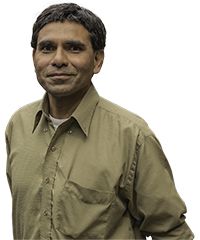Opinion
Mishra’s Mishmash: Social isolation and loneliness: major health issues for coming decade
Mrutyuanjai Mishra
This article is more than 5 years old.
The queen of Denmark has been remarkably successful at setting new agendas for public discourse despite the fact she is not the political head of the country.
For 48 consecutive years the queen’s speech has been broadcast to the nation live on television on New Year’s Eve when people are still sober. This time awaiting a new decade, a large proportion of Danes were once again glued to their television listening to Queen Margrethe.
We can see it is televised live because she clearly had a cold and took a handkerchief to blow her nose in the middle of her speech, making it a very human experience. There is no time nor possibility to cut out such moments.
Not just alone
She often picks a few subjects to highlight their importance to the nation, and this year she picked two: growing anti-Semitism in Denmark and the unhealthy effect of loneliness.
Since anti-Semitism has been widely debated, I would like to focus on the importance of the new discussion regarding loneliness in Denmark.
Part of the debate surrounds what constitutes loneliness. Traditionally, many associate it with people who are simply on their own and have limited social contact with others. They might live on their own and be unemployed or incapacitated. More likely they are elderly and their partner is no longer alive.
But loneliness can also increasingly be defined as perceived social isolation experienced by people who are often in contact with people via social media, but live a life bereft of meaningful social contact.
Physical toil
Approximately 210,000 people, some 4.6 percent of the Danish population, feel lonely. Feeling lonely has severe effects on a person’s physical health, and it can often be worse than smoking or being overweight. This emphasises how we human beings are not just generic but also social, and social acceptance has a tremendous effect on our health.
Teasing and bullying at schools, in the workplace or on social media leaves many people feeling lonely. And in turn, their feelings can have a knock-on effect as they find reasons not to interact with other lonely people – their parents or grandparents, for example.
And while everyone is vulnerable to loneliness, it can be worse in villages or small towns where many risk getting physically trapped in spaces where a social life is not feasible.
In touch with her people
The bottom line is that despite the popularity of social media platforms like Facebook, a huge number of people in Denmark feel lonely.
Newcomers to Denmark should know that Danes form all sorts of groups to cultivate their social lives. From mixing with the parents of their school children’s friends, to trade unions and sports clubs, meeting people is encouraged across all facets of society.
Actually, Denmark probably has the world record for the most social interest groups. From joining a badminton club to hooking up with fellow vegetarians to sample new delicacies, taking part is a surefire way of making new friends.
So the queen was absolutely right to make loneliness a major theme of her speech ahead of a brand new decade in Denmark. Her concern is just one of many reasons why she and the rest of the Royal Family remain popular and are seen as an important stabilising institution in Denmark.

About
Mrutyuanjai Mishra
As a regular contributor to the Times of India, the country’s largest newspaper, Mishra is often sought-after by Danish media and academia to provide expertise on Asian-related matters, human rights issues and democratisation. He has spent half his life in India and the other half in Denmark and Sweden.










































